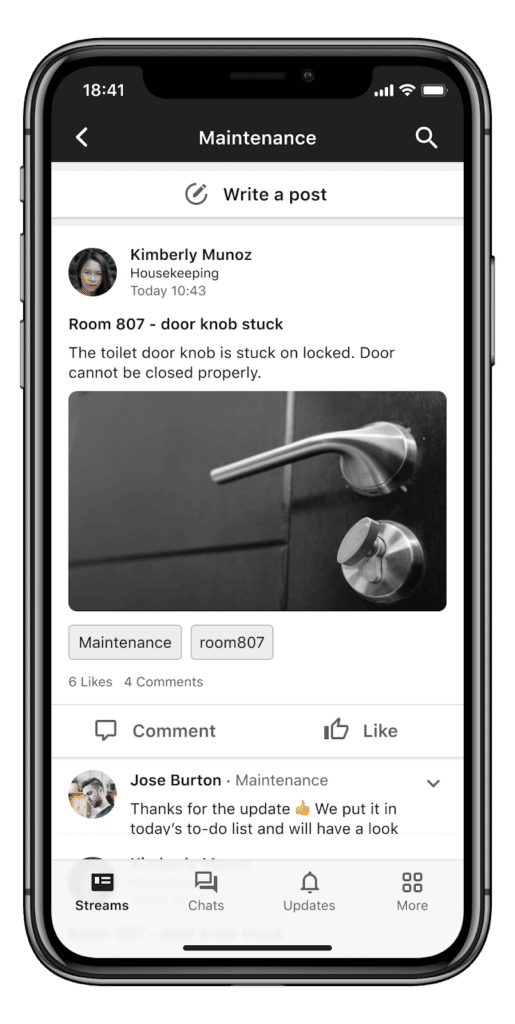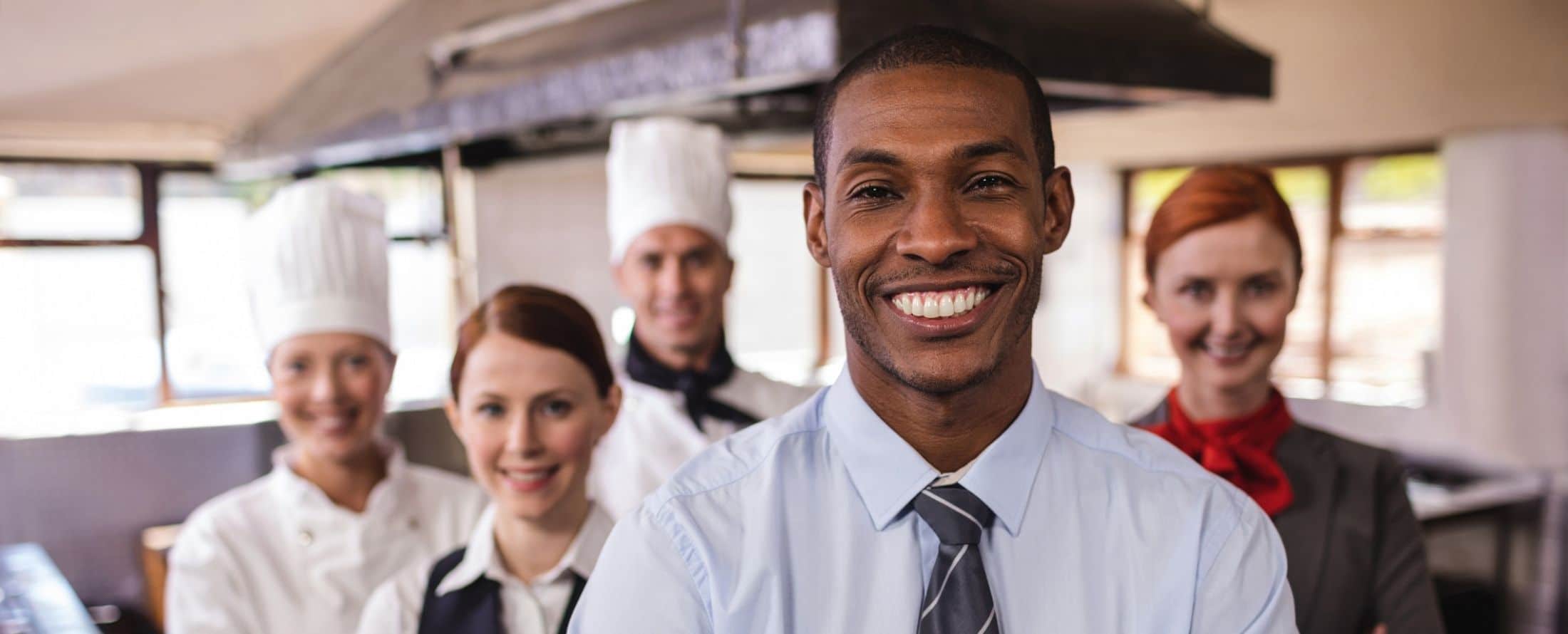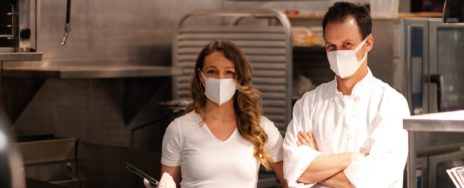The hospitality industry was hit hard by COVID-19 and hotels are still in the process of recovery. One of the biggest challenges for hotels right now? Hiring employees.
The road to recovery seems simple: hire back furloughed employees who are waiting to come back to their old positions.
The reality isn’t as straightforward. Conditions and expectations have changed, both for hotel management and staff. We’ll be taking a look at the current challenges in hiring employees and what hotels can do to navigate them successfully.
At Beekeeper’s first Frontline Future 2021 virtual summit, one session dove into the topic of hiring and retention in the new normal, how hotels can adapt to changing consumer behavior when it comes to post-pandemic travel.
The panelists for this session included:
- Andrada Paraschiv—VP of Hospitality, Beekeeper
- Edward Gallier—Head of Learning and Development, Jury’s Inn
- Sandy Gentles—VP, Talent Point Marriott
Hospitality Workers Are Evaluating Their Options
Although travel restrictions are lifting, the hospitality industry is still in a transitional period.
In North America, leisure travel is returning, but there is more need for part-time positions and often not enough hours to support full-time employees. The COVID relief package has meant that former hotel staff have had more time to think about if and when to come back to work.
Many hotels have had to furlough, re-hire, and furlough again, decreasing employees’ confidence in the reliability of a job in hospitality. With customer service training, hotel employees have the ability to choose to move to a different industry.
“Hospitality has to fight for its space in the recruitment market.”
– Edward Gallier, Jurys Inn
The pandemic might also have prompted employees to re-think their priorities when it comes to work/life balance. Unless hotels give employees a good reason to stay, many might look elsewhere.
The New Normal From a Hotel Employee’s Perspective
In order to get a deeper insight into what motivates hotel employees to stay and do their best work, it’s important to consider how their roles have shifted during and after the pandemic.
During the pandemic, many hotels have had to limit their staff to the bare minimum. For employees, that meant more responsibility.
With less people and more things to do, staff have had to step up significantly to continue delivering a great guest experience.
For many hotel employees, the pandemic required them to develop a greater level of resiliency and adaptability.
Hotel employees have had to adapt to working with a mask and screen, all while stepping into roles they may not have had experience with before. The result has been a mental and physical strain that should not be overlooked.
“A good employer will continue to try harder. One model that fits everybody is not the case anymore. Having that level of personalization in each hotel will be key.”
– Edward Gallier, Jurys Inn
The small percentage of employees who were not furloughed had to work hard to make sure operations stayed efficient. For furloughed associates, the loss of income and ability to be part of a team were equally tough sacrifices.
In many cases, returning to hospitality will be a choice fueled by the passion to serve guests. Hotels that acknowledge the frontline employee experience and work to improve it will have the best chance of hiring the staff they need.
3 Ways Hotels Can Hire and Retain Workers with a Better Employee Experience
So what needs to happen for hotels to bring back their old employees and start hiring new ones?
Ultimately, it’s about creating a role people want to take. Here three ways hotels can improve the employee experience and get a leg up in the reskilling revolution:
1) Provide a Channel for Associates to Share Information in Real Time

During the pandemic, sharing critical updates about ever-shifting safety procedures became the norm for many companies that employ frontline employees.
As hotels transition into a post-pandemic world, their employees expect that level of communication to continue. Transparent internal communications about what procedures have changed and why is not only reassuring for employees but empowering, too.
2) Prioritize Organizational Flexibility
There are three levels of organizational flexibility that will impact hotel operations post-pandemic.
- Individual: Many hotel employees, particularly those that have been furloughed, have reevaluated their needs in terms of work/life balance. Offering a flexible schedule to accommodate for responsibilities like childcare will help retain valuable staff and attract new hires.
- Training: The limits of physical distancing during the pandemic forced hotels to become more flexible in training their employees. Moving forward, hotels can continue to innovate their training processes. For example, managers can show new processes via video instead of holding in-person sessions.
Pro tip: Using a mobile employee platform like Beekeeper allows hotel managers to share videos and train staff remotely.
- Hiring: While former hotel employees may be looking to switch industries, hotels can start looking outside the typical recruitment channels to source new associates. With technology that helps new hires learn skills quickly, hotels can look for potential employees in a more diverse range of industries.
3) Digital Enablement of Associates

Sharing company news and updates via a mobile app is just the first step in digitally transforming the hospitality industry. Establishing a collaborative environment via digital enablement empowers hotel staff to solve issues faster and deliver exceptional customer service.
For example, hotel managers can share what a COVID-safe environment looks like. But digitally-enabled teams can give each other recommendations or potential solutions that may not be department-specific. A housekeeper can share a recurring issue via video to the whole staff and an engineer might pick up on a solution.
Long-Term Consequences of the Reskilling Revolution
For the hospitality industry, long-term thinking took a back seat to short-term crisis control in 2020.
That said, the legacy of the pandemic will most likely shape hotel operations in the future in two important ways:
- Greater focus on the breadth of skills: The necessity for hotel employees to take on multiple responsibilities will influence a greater understanding of colleagues with different roles. Cross-departmental communication and training will encourage a more collaborative working environment.
- Working smarter: Doing more with less became the mantra of many hotels during the pandemic. Now, hotels will continue to find ways to provide services and complete tasks in the most efficient manner possible.





